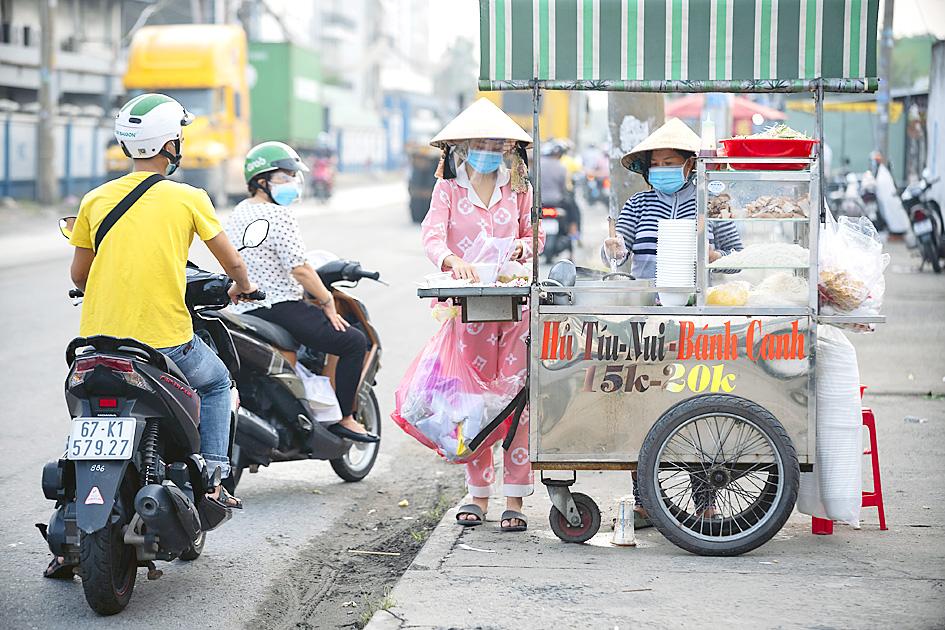Units of Intel Corp and Samsung Electronics Co are targeting to resume full operations of their Ho Chi Minh City plants by the end of next month, a move that could provide relief to global supply chains.
Saigon Hi-Tech Park is helping its tenants, many of which are running at about 70 percent capacity, to operate fully next month, park deputy manager Le Bich Loan said in a phone interview.
She did not elaborate on the steps the park is taking, particularly efforts at bringing back workers who fled to home provinces.

Photo: Bloomberg
The Ho Chi Minh City unit of Nidec Sankyo Corp, maker of magnetic card readers and micro motors, also expects to return to full operations late next month, Saigon Giai Phong newspaper reported, citing Loan.
The technology park is home to dozens of factories that produce components or services for global companies.
Representatives of Samsung, Intel and Nidec Sankyo did not immediately respond to requests for comment.
Many companies operating in Saigon Hi-Tech Park lost about 20 percent of their export orders in July and August, Loan was quoted as saying by Saigon Giai Phong.
COVID-19 infections surged in Vietnam during those months, prompting movement restrictions and, in some factory belts, government requirements to provide on-site sleeping arrangement for workers or shut down.
Samsung in July shut three of its 16 workshops in Saigon Hi-Tech, as it also reduced workers at its HCMC CE Complex by more than half.
Intel, which has a test and assembly plant in Saigon Hi-Tech, had its workers on a sleepover arrangement to avoid halting operations.
While small, Vietnam plays an out-sized role in the global consumer economy, supplying everything from Walmart Inc furniture and Adidas AG sneakers to Samsung smartphones.
After China, it is the second-largest supplier of clothes and shoes to the US, according to the American Apparel and Footwear Association. Its importance increased during the trade dispute between the US and China, as manufacturing moved there to avoid tariffs.
At this point, there is little brands like Nike Inc, which recently cut its sales forecast largely on the lack of goods from Vietnam, can do. Factories in other countries are overloaded with orders, and it would take months to train workers and move machinery.
The missed production would be especially apparent at retailers in December and extend well into the first quarter, said Camilo Lyon, an analyst for BTIG who projected that output from Vietnam would not return to normal until the middle of next year.
The full impact of this upheaval has not been priced into the stocks of apparel and footwear companies with big exposure to Vietnam, he said.
“The challenges are by no means over,” Lyon said.

SEMICONDUCTORS: The German laser and plasma generator company will expand its local services as its specialized offerings support Taiwan’s semiconductor industries Trumpf SE + Co KG, a global leader in supplying laser technology and plasma generators used in chip production, is expanding its investments in Taiwan in an effort to deeply integrate into the global semiconductor supply chain in the pursuit of growth. The company, headquartered in Ditzingen, Germany, has invested significantly in a newly inaugurated regional technical center for plasma generators in Taoyuan, its latest expansion in Taiwan after being engaged in various industries for more than 25 years. The center, the first of its kind Trumpf built outside Germany, aims to serve customers from Taiwan, Japan, Southeast Asia and South Korea,

POWERING UP: PSUs for AI servers made up about 50% of Delta’s total server PSU revenue during the first three quarters of last year, the company said Power supply and electronic components maker Delta Electronics Inc (台達電) reported record-high revenue of NT$161.61 billion (US$5.11 billion) for last quarter and said it remains positive about this quarter. Last quarter’s figure was up 7.6 percent from the previous quarter and 41.51 percent higher than a year earlier, and largely in line with Yuanta Securities Investment Consulting Co’s (元大投顧) forecast of NT$160 billion. Delta’s annual revenue last year rose 31.76 percent year-on-year to NT$554.89 billion, also a record high for the company. Its strong performance reflected continued demand for high-performance power solutions and advanced liquid-cooling products used in artificial intelligence (AI) data centers,

Gasoline and diesel prices at domestic fuel stations are to fall NT$0.2 per liter this week, down for a second consecutive week, CPC Corp, Taiwan (台灣中油) and Formosa Petrochemical Corp (台塑石化) announced yesterday. Effective today, gasoline prices at CPC and Formosa stations are to drop to NT$26.4, NT$27.9 and NT$29.9 per liter for 92, 95 and 98-octane unleaded gasoline respectively, the companies said in separate statements. The price of premium diesel is to fall to NT$24.8 per liter at CPC stations and NT$24.6 at Formosa pumps, they said. The price adjustments came even as international crude oil prices rose last week, as traders

SIZE MATTERS: TSMC started phasing out 8-inch wafer production last year, while Samsung is more aggressively retiring 8-inch capacity, TrendForce said Chipmakers are expected to raise prices of 8-inch wafers by up to 20 percent this year on concern over supply constraints as major contract chipmakers Taiwan Semiconductor Manufacturing Co (TSMC, 台積電) and Samsung Electronics Co gradually retire less advanced wafer capacity, TrendForce Corp (集邦科技) said yesterday. It is the first significant across-the-board price hike since a global semiconductor correction in 2023, the Taipei-based market researcher said in a report. Global 8-inch wafer capacity slid 0.3 percent year-on-year last year, although 8-inch wafer prices still hovered at relatively stable levels throughout the year, TrendForce said. The downward trend is expected to continue this year,